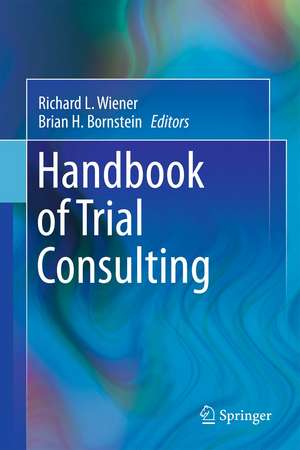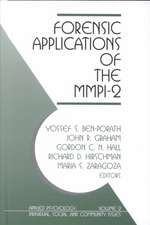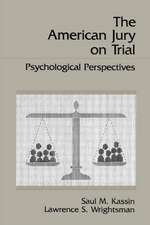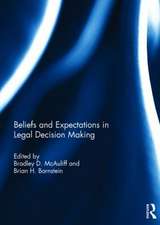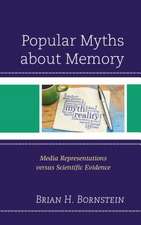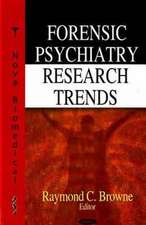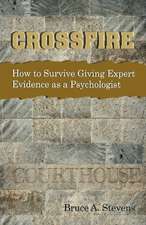Handbook of Trial Consulting
Editat de Richard L. Wiener, Brian H. Bornsteinen Limba Engleză Paperback – 8 oct 2014
| Toate formatele și edițiile | Preț | Express |
|---|---|---|
| Paperback (1) | 646.43 lei 6-8 săpt. | |
| Springer Us – 8 oct 2014 | 646.43 lei 6-8 săpt. | |
| Hardback (1) | 652.31 lei 6-8 săpt. | |
| Springer Us – 11 mai 2011 | 652.31 lei 6-8 săpt. |
Preț: 646.43 lei
Preț vechi: 760.50 lei
-15% Nou
Puncte Express: 970
Preț estimativ în valută:
123.71€ • 127.80$ • 102.96£
123.71€ • 127.80$ • 102.96£
Carte tipărită la comandă
Livrare economică 25 martie-08 aprilie
Preluare comenzi: 021 569.72.76
Specificații
ISBN-13: 9781489987389
ISBN-10: 148998738X
Pagini: 420
Ilustrații: X, 409 p.
Dimensiuni: 155 x 235 x 22 mm
Greutate: 0.59 kg
Ediția:2011
Editura: Springer Us
Colecția Springer
Locul publicării:New York, NY, United States
ISBN-10: 148998738X
Pagini: 420
Ilustrații: X, 409 p.
Dimensiuni: 155 x 235 x 22 mm
Greutate: 0.59 kg
Ediția:2011
Editura: Springer Us
Colecția Springer
Locul publicării:New York, NY, United States
Public țintă
ResearchCuprins
Section I: An Introduction to the Theory and Psychology of Jury Decision Making.- An Overview and General Model of Juror and Jury Decision-Making.- The Story Model Theory of Jury Decision Making.- Statistical Models of Jury Decision Making. Section II: Applied Research Methodologies for Trial Consultants.- Focus Groups.- Systematic Jury Selection.- Persuasion and Argument Development.- Mock Trial Research.- Survey Research. C. Education and Ethical Considerations for Trial Consultants.- Training and Education.- Ethical Issues.- Professional Issues.- Reform Movements.- Lawyers View of Trial Consulting.- Judge’s View of Trial Consulting. D. Preparing and Cross-Examining Witnesses.- Eyewitness identification and lineups.- Admissibility of Expert Witness Testimony.- Witness Preparation.- Selecting Experts. E. Technology and Demonstrative Evidence at Trial.- Technology and Trial Consulting I. 20. The Use of Demonstrative Evidence.- Technology II : The Role of the Trial Consultant. F. Special Topics in Law and Psychology.- Psychopathy.- Discrimination.- Change of Venue and Pretrial Publicity.- Assessment of Damages I: Mental and Social Health.- Assessment of Damages II: Neuropsychological Concerns.- Decision Making about Damages.- Jury Instructions.- The Future of Trial Consulting.
Recenzii
From the reviews:
“Handbook is principally oriented towards psychologists, it can also be very useful to other social scientists or legal practitioners … . very useful to those who are interested in examining more in depth the legal and theoretical issues … . chapters are very practical, are clearly evidence based, and can be useful to both lawyers and trail consultants. … The Handbook of Trial Consulting provides … a comprehensive, state-of-the-art review of the major areas that can be subsumed under the title.” (Michel Sabourin, PsycCRITIQUES, Vol. 56 (48), November, 2011)
“Handbook is principally oriented towards psychologists, it can also be very useful to other social scientists or legal practitioners … . very useful to those who are interested in examining more in depth the legal and theoretical issues … . chapters are very practical, are clearly evidence based, and can be useful to both lawyers and trail consultants. … The Handbook of Trial Consulting provides … a comprehensive, state-of-the-art review of the major areas that can be subsumed under the title.” (Michel Sabourin, PsycCRITIQUES, Vol. 56 (48), November, 2011)
Notă biografică
Professor Wiener received his Ph.D. from the University of Houston and his Masters Degree in Legal Studies at UNL. He was professor of Psychology at Saint Louis University (1982- 2000) and most recently chair of the Department of Psychology at Baruch College, City University of New York. In 2002 Dr. Wiener joined the Law-Psychology Program (as director) and the Social Psychology Program at UNL. He is the former editor of Law and Human Behavior, the official journal of the American Psychology/Law Society (Division 41 of the APA). Dr. Wiener's research applies theories of social cognition to problems in legal decision-making. Among the topic areas he has investigated are perceptions of sexual harassment and jury decision making. Specifically, Dr. Wiener studies the role of generic prejudice in criminal cases and he studies how jurors reach capital murder decisions in assigning penalties. The National Science Foundation has funded and continues to fund this work. Currently, Dr. Wiener applies social cognitive theories of emotion, motivation, dual process of cognitive processing to explain how legal actors reach decisions relevant to law and policy. Other topics of investigation include the role of implicit attitude activation in generic prejudice, the role of emotions in jury judgments as they develop across the presentation of criminal cases, the role of mortality salience in death penalty judgments, and the role of counterfactual thinking in negligence judgments. Dr. Wiener teaches courses at UNL on behavioral sciences and the law and legal decision making.
Textul de pe ultima copertă
Handbook of Trial Consulting
Richard L. Wiener and Brian H. Bornstein, editors
Since its beginnings in scientific jury selection, trial consulting has engendered a growing academic literature, a professional association, and a thriving industry covering many discrete areas of practice. And while there is no specific course of study for trial consultants, much of what constitutes the field falls under the heading of legal psychology, with a number of available volumes on the subject. The Handbook of Trial Consulting differs from the others in its emphasis on social analytic jurisprudence, an empirically-based interdisciplinary lens for understanding legal issues and testing the assumptions that the law, and lawyers, make about human behavior, helping to ensure impartial, efficient service in diverse contexts while minimizing procedural and ethical pitfalls. Contributors focus on applied research methods, effective testimony strategies, specific psycholegal issues, and professional concerns to examine what trial consultants should know about:
Richard L. Wiener and Brian H. Bornstein, editors
Since its beginnings in scientific jury selection, trial consulting has engendered a growing academic literature, a professional association, and a thriving industry covering many discrete areas of practice. And while there is no specific course of study for trial consultants, much of what constitutes the field falls under the heading of legal psychology, with a number of available volumes on the subject. The Handbook of Trial Consulting differs from the others in its emphasis on social analytic jurisprudence, an empirically-based interdisciplinary lens for understanding legal issues and testing the assumptions that the law, and lawyers, make about human behavior, helping to ensure impartial, efficient service in diverse contexts while minimizing procedural and ethical pitfalls. Contributors focus on applied research methods, effective testimony strategies, specific psycholegal issues, and professional concerns to examine what trial consultants should know about:
- Jury selection and jury decision-making
- Social-cognitive aspects of legal persuasion
- The admissibility of expert witness testimony.
- Using survey research, statistics, and technological evidence
- Assessment of monetary and neuropsychological damages
- Avoiding conflicts of interest
Caracteristici
Provides an interdisciplinary perspective
Contributors are prominent legal scholars and social scientists
Covers often overlooked problems
Includes supplementary material: sn.pub/extras
Contributors are prominent legal scholars and social scientists
Covers often overlooked problems
Includes supplementary material: sn.pub/extras
